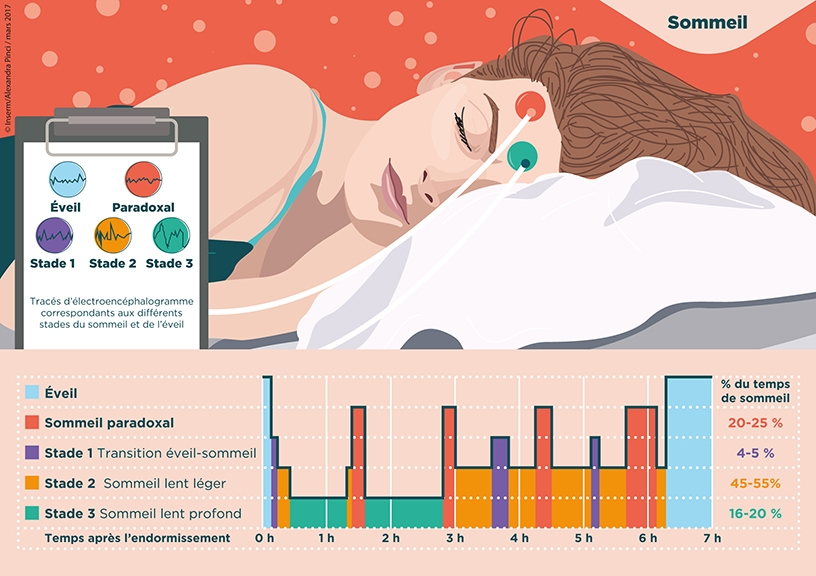A recent study affirms that sleeping in on weekends would compensate for the lack of sleep accumulated during the week and extend life expectancy. Explanations.

A new Swedish study published on May 22 in the Journal of Sleep Research shows that sleeping in on weekends would increase your life expectancy. However, many scientists remain skeptical of the results of this research.
To come to this pleasant conclusion, researchers from Stress Research Institute of Stockholm analyzed data collected in a lifestyle study of 38,000 Swedes, followed for 13 years. They took into account factors such as gender, physical characteristics, athletic activity, and alcohol and cigarette consumption of the participants.
“Catch-up sleep”
As a result, adults under 65 who slept less than five hours a night had a 65% higher death rate than those who slept more than six hours on a regular basis. Another notable finding: people sleeping more than nine hours per night, on the other hand, had a higher death rate than others. For Torbjörn Åkersted, the study’s lead author, this could be explained by the fact that someone who spends a lot of time in bed usually has health problems.
But if you have a stressful job that prevents you from sleeping properly during the week, don’t panic, since according to Swedish researchers, sleeping in on weekends or during your days off would erase the bad effects of withdrawal. weekly sleep. Indeed, the mortality rate would be the same for those who sleep little during the week but sleep late the rest of the time as those who sleep between six and seven hours a night during the week and at weekends.
“The assumption here is that weekend sleep is catch-up sleep,” says Torbjörn Åkersted. Because, “the duration of sleep is essential to live long,” he adds.
But while all scientists agree that sleep is good for humans, sleeping in is a controversial subject. Indeed, in the past, other studies have already highlighted its negative effects on health. In 2015, an American study carried out by the University of Pittsburg in Pennsylvania, for example, argued that by shifting the biological clock of sleepers, it tended to promote diabetes and cardiovascular disease.
Listen to your biological clock
The results of this study should therefore be taken with a grain of salt. Especially since, if it is based on data collected over 13 years, behavior during sleep was only analyzed at the beginning. Furthermore, the panel studied is not representative of an entire population. Indeed, the participants having been chosen during a charity gala against cancer, few of them were smokers.
Michael Grandner of the University of Arizona is therefore very skeptical of the results. According to him, resting on weekends to make up for the general lack of sleep would be like eating vegetables after consuming several burgers. While this is certainly necessary, it is not enough to reverse the harmful effects of junk food.
According to The Guardian, the best is therefore to trust nature. Our sleep being regulated by our biological clock, we should not resist the call of Morpheus when we are sleepy and avoid becoming disturbed as much as possible so as not to traumatize our body. And while it is true that the need to sleep varies from person to person, in the end, the “sleep debt” always has to “be settled”, concludes Stuart Peirson of the University of Oxford.
The importance of sleep for body and mind
“Sleep corresponds to a drop in the state of consciousness that separates two periods of wakefulness. It is characterized by a loss of vigilance, a decrease in muscle tone and a partial conservation of sensitive perception “, describes Inserm. In France, one in three people suffers from sleep disorders. Overall, the French sleep on average 1.5 hours less than 50 years ago: 45% of 25-45 year-olds consider that they sleep less than necessary and 13% of 25-45 year-olds believe that sleeping is a waste of time.
However, sleeping does not only allow you to rest: sleep is essential for the child’s brain development, but also for the elimination of waste produced by the functioning of the brain. Having insomnia, or limiting your sleep time, therefore puts you at risk for alertness and learning. In addition, sleep disorders are associated with various diseases, including overweight, obesity or even cardiovascular disease.
“Schematically, sleep corresponds to a succession of 3 to 6 successive cycles, of 60 to 120 minutes each. A cycle is itself made up ofan alternation of slow sleep and REM sleep “.

Infographic illustrating the different stages of sleep and wakefulness recorded on a subject, by electroencephalogram, during the night. Sleep consists of REM sleep, wake-to-sleep transition (stage 1), light slow sleep (stage 2), and deep slow sleep (stage 3). As the night progresses, deep slow sleep decreases in favor of light slow sleep. © Inserm / Pinci, Alexandra

.














